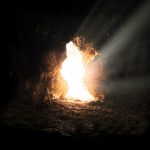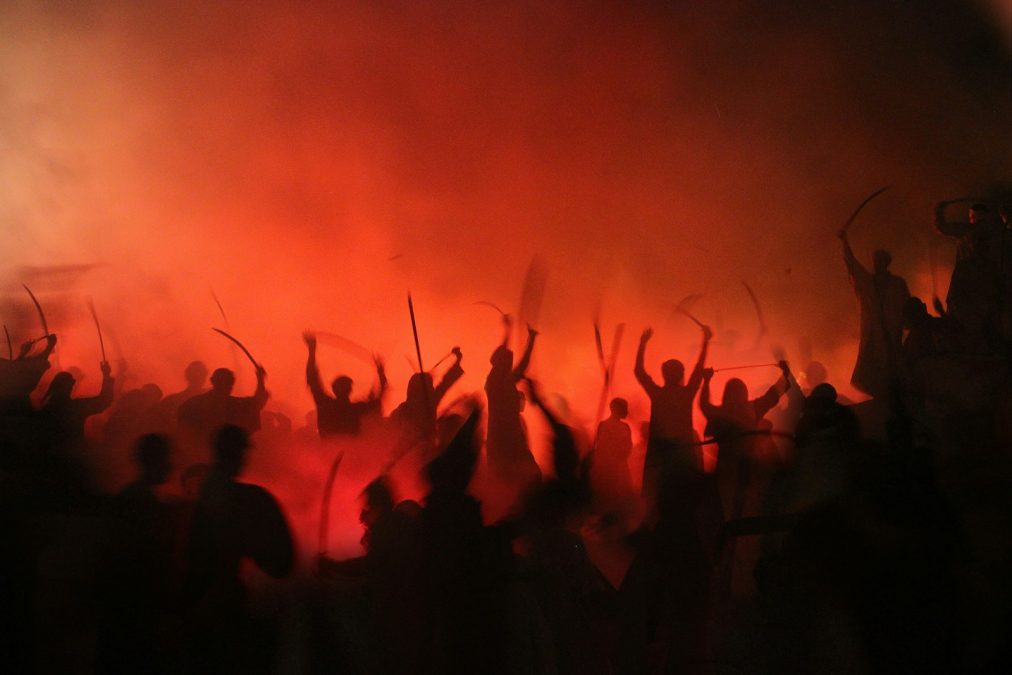
Nick Cave’s Wild God
April 6, 2024
Perishing or Becoming?
April 18, 2024In 1274, Humbert of Romans, Master General of the Dominican Order, wrote a treatise which set out to theologically justify the crusades, and to respond to various critics who were arguing that crusading incompatible with the demands of Christianity. Some people, he said, were arguing that it was wrong for Christians to shed blood. After all, don’t the examples of Christ and the martyrs suggest that the truly Christian path is to turn the other cheek and to refuse violence, even if it costs us our lives? Ah, says Humbert, there is a time to build and a time to tear down buildings; a time to refuse the sword and a time to take it up. What if infidels wanted to kill every Christian and erase Christianity from the face of the earth; surely then Christians would not continue to preach peace?
Others were saying that it’s wrong for Christians to go to war because of the loss of life sustained by Christians in the process. It’s true, Humbert acknowledges, that some lives have been lost. But, he asks, haven’t more Muslim lives been lost than Christian? Anyway, if Christians weren’t waging a war of aggression, imagine what the Muslims would be doing to the Christians right now. There’s no end to the hostility and ill-will of the Muslims, he says. Besides, how can Christians accept the occupation of the land of Israel by such an evil people, who do not allow for true Christian worship? Did not God command the Hebrews never to make treaties with the worshippers of false gods who occupied the promised land? The Crusaders, Humbert insists, are not invading other people’s territory, but taking back their own land, the land which God gave first to the Jews and then to the Christians.
Humbert goes on to remind his readers of Jesus’ parable about a field where the wheat was growing alongside weeds. The servants of the field’s owner asked if they should pull up the weeds, but the owner told them to hold back – pulling up the weeds would also damage the wheat. Instead, he said, the servants should wait until harvest time to separate out the good plants from the bad. But what of a field which has only wheat and no weeds, Humbert asks? Shouldn’t the plants all be pulled up? Isn’t the Holy Land like a fig tree which bears no fruit, and should be cut down; or like the city of Sodom, in which not even ten good men could be found, and which should be razed to the ground with fire?
The editors’ note I have attached to my copy of Humbert’s text says that his arguments ‘would certainly not convince anyone today’. But they’re all too familiar. Humbert draws on biblical passages in which God commands the Hebrew people to enter the promised land and to wipe out its existing inhabitants; to erase their religion, their culture, and their memory from the earth. Contemporary scholarship suggests that this violent erasure of the Canaanites never actually took place. But the biblical text comes to us now dripping with blood, thanks to the work of Christian interpreters in whose hands it became a warrant not only for the ultimately failed Christian attempt to recapture Jerusalem for Christianity, but also for the brutal expulsion of Jews and Muslims from medieval Spain, and for the modern invention of settler colonialism. As Native American scholars Robert Warrior and Roxane Dunbar-Ortiz have shown, the theological tools developed by Humbert and his contemporaries to justify the Crusades were wielded once again during the conquest of the Americas and European attempts to wipe Native Americans from the face of the earth. They are wielded again today both by Christian Zionists and by the state of Israel, arguing that the mass killing and starvation of Palestinians is both necessary and morally justified.
What does liberation theology look like in the context of genocide? As Robert Warrior points out, the other side of the story of the liberation of the Hebrew people from captivity in Egypt is the story of their conquest of the land of Canaan, and God’s injunctions to wipe the Canaanites from the face of the earth. In 1989, Warrior asked what would it look like to place the Canaanites at the centre of Christian theology and action. “With what voice will we, the Canaanites of the world, say, ‘Let my people go, and leave my people alone?’ Is there a god, a spirit, who will hear us and stand with us in the Amazon, Osage County, and Wounded Knee? Is there a god, a spirit, able to move among the pain and anger of Nablus, Gaza, and Soweto?” It is difficult to read this text thirty years later, knowing how many more lives have been sacrificed on the altar of Christian fear and Christian violence. What does it mean to be faithful to the God of those who are building warplanes, authorising arms sales, and targeting schools and hospitals? What does it mean to inherit a tradition which has been insisting that there are no innocents in Gaza since as far back as the 13th century? It is not enough simply to insist that Christianity stands for peace. Christ has no hands on earth but our hands, and our hands are stained with blood.
Marika Rose is author of ‘Theology for the End of the World’ and a member of Christians for Palestine




